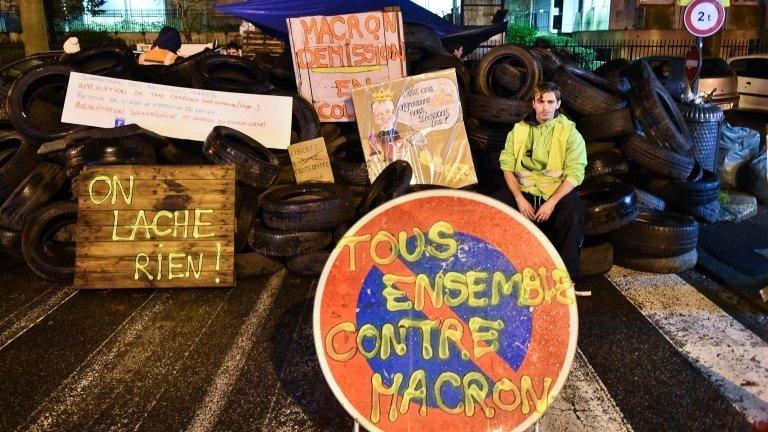Yellow vests: France protests 'created a monster', says minister
- Published
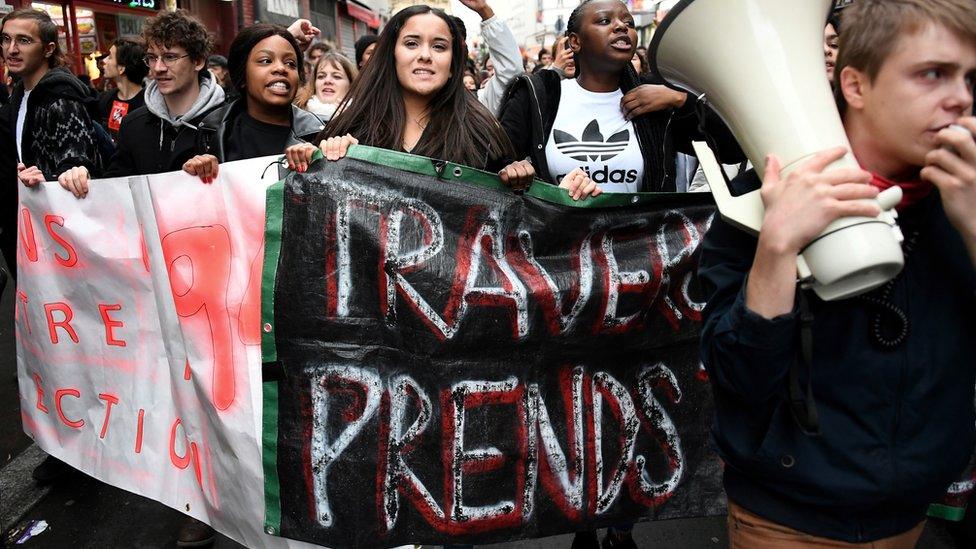
Protests have been taking place at over 280 schools across the country
Anti-government protests in France have "created a monster", France's Interior Minister Christophe Castaner has said.
And he is warning that "radical elements" could infiltrate planned "yellow vest" protests at the weekend.
Tourist sites in Paris are to close on Saturday amid fears of further street violence.
The protests began three weeks ago, initially against a rise in fuel taxes but have spread to take in other issues, including education reforms.
Mr Castaner said "large-scale security measures" would be put in place this weekend.
Across France, 89,000 police officers will be on duty and armoured vehicles will be deployed in the capital, Prime Minister Edouard Philippe announced.
Paris police have urged shops and restaurants on the Champs-Elysees to shut and some museums will also be closed.
Will you be affected by the planned closures? Email haveyoursay@bbc.co.uk, external
The government has said it is scrapping the unpopular fuel tax increases in its budget - but discontent with the government has spread and protests have erupted over other issues.
Further protests have been reported in the east of country.
One student has been injured, external following a demonstration in the town of Montbéliard, about 13km from the border with Switzerland, local media report. A police officer was seriously injured at a student protest in Mulhouse, according to French broadcaster BFMTV.
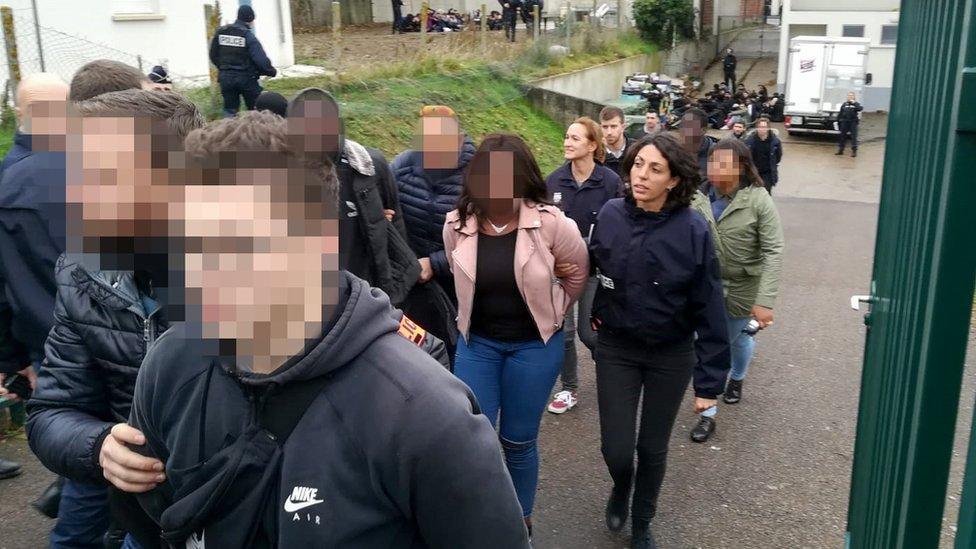
Images of high school students being detained in Mantes-la-Jolie to the west of Paris have caused widespread anger
The AFP news agency reports that authorities seized 28 Molotov cocktails and 3 homemade bombs from "yellow vest" protesters in the south of the country.
There has also been widespread anger at images showing how police made high school students kneel and put their hands behind their heads following clashes on Thursday in Mantes-la-Jolie, to the west of Paris.
What has the government said?
Mr Castaner told reporters that the past three weeks of demonstrations had "created a monster that escaped from its creators."
He said authorities would respond with "firmness".
He went on: "I will have no tolerance of those who capitalise on the distress of our citizens."
An official with the interior ministry told AFP news agency authorities were braced for "significant violence" on Saturday, with activists from both the far right and far left planning to converge on the capital.
In an interview with TV channel TF1, Mr Philippe said 8,000 police would be deployed in Paris as well as a dozen armoured vehicles.
He repeated an appeal for calm but added: "We are facing people who are not here to protest, but to smash and we want to have the means not to give them a free rein."
Earlier, Mr Philippe suggested there might be further concessions to protesters, telling the Senate that the government was open to new measures to help the lowest-paid workers.
How will Paris be affected?
The operator of the Eiffel Tower said the threat of violent protests on Saturday made it impossible to ensure "adequate security conditions".
City authorities say they are stepping up protection for famous landmarks after the Arc de Triomphe was damaged last week.
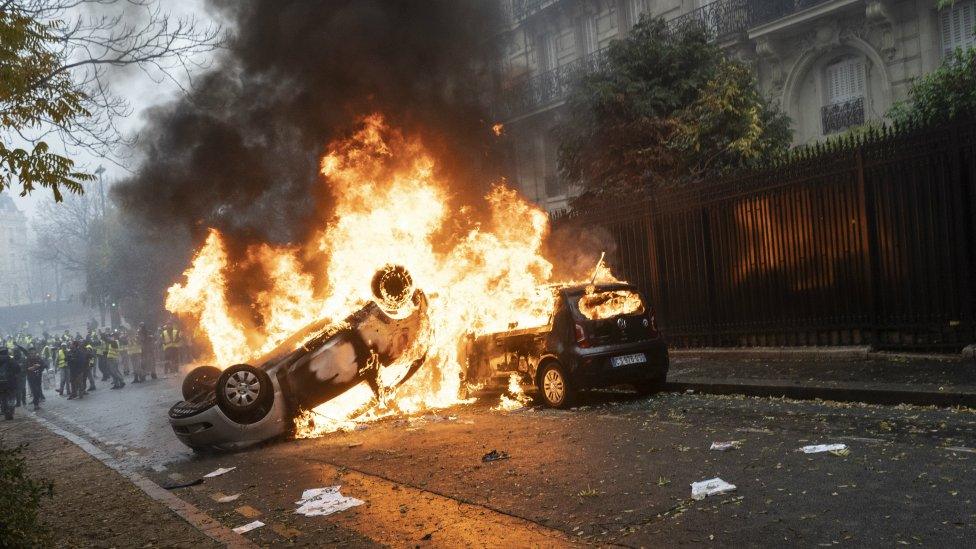
Last Saturday's violence in Paris shocked the country
Museums, including the Louvre and Orsay, opera houses and the Grand Palais complex will close on Saturday.
Police have asked businesses along the Champs-Elysees and other major shopping streets to stay closed and to remove any outdoor items such as tables and chairs.
Several football matches have also been postponed, including those between Paris and Montpellier, and Saint-Etienne and Marseille.

What other protests have there been?
On Thursday young people took to the streets, protesting over education reforms.
More than 140 people were arrested when a protest outside a school in Mantes-la-Jolie, to the west of Paris, ended in clashes with police. Two cars were set on fire.
Pictures of the arrests, in which the students were made to kneel and put their hands behind their heads, sparked outrage on social media. French broadcaster BFMTV said the incident lasted "several hours."
Allow X content?
This article contains content provided by X. We ask for your permission before anything is loaded, as they may be using cookies and other technologies. You may want to read X’s cookie policy, external and privacy policy, external before accepting. To view this content choose ‘accept and continue’.
"Now there's a well-behaved class," a police office was heard saying on video.
The town's police chief told Le Monde newspaper that those arrested were suspected of taking part in an "armed gathering", adding that officers had wanted to break up a situation that was getting "out of control." , external
Education Minister Jean-Michel Blanquer said he was "clearly shocked", by the events but added that they must be put in "context". Mr Castaner described the images as "tough" to watch but added that the students had been joined by armed protesters.
Dozens of schools were blockaded in cities including Marseille, Nantes and Paris. Students have been angered by President Emmanuel Macron's plans to change the end-of-school exam, known as the baccalaureate, which is required for entrance to university.
Critics fear the reforms will limit opportunity and breed inequality.
Who are the protesters?
The "gilets jaunes" protesters, so-called because they have taken to the streets wearing the high-visibility yellow clothing that is required to be carried in every vehicle by French law, initially complained at a sharp increase in diesel taxes.
Mr Macron said his motivation for the increase was environmental, but protesters accused him of being out of touch.
The government later scrapped the plan but the yellow vest protesters were not placated. Last week, the movement - despite a lack of central leadership - issued more than 40 demands to government.
Among them were a minimum pension, widespread changes to the tax system, and a reduction in the retirement age.
The protest movement has gained momentum via social media, encompassing a whole range of participants from the anarchist far left to the nationalist far right, and moderates in between.
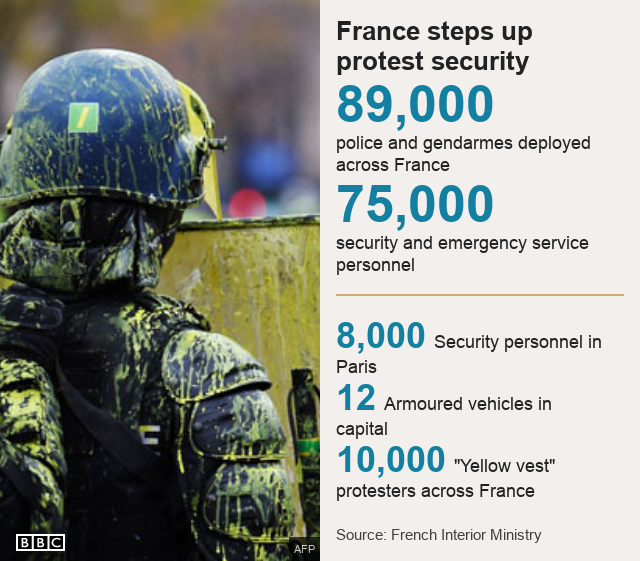
- Published6 December 2018
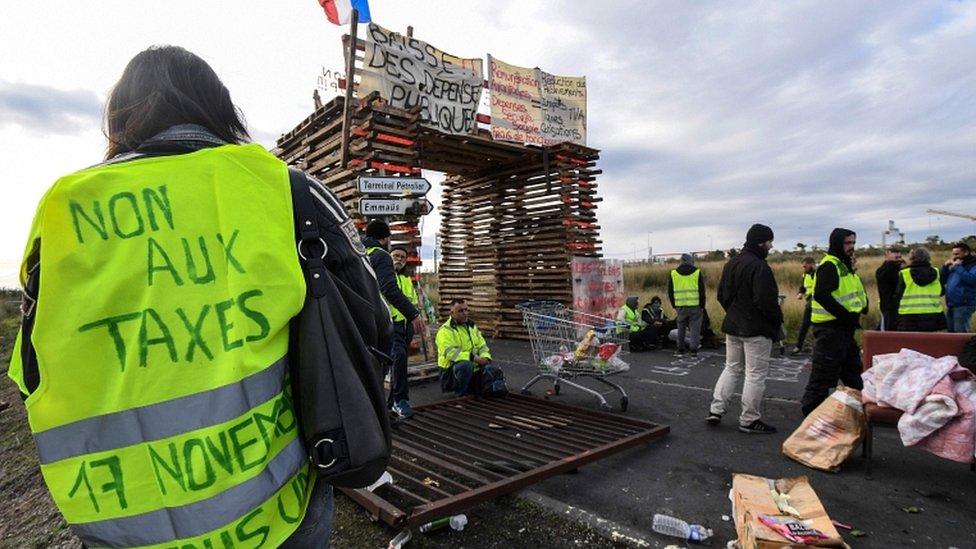
- Published3 December 2018
